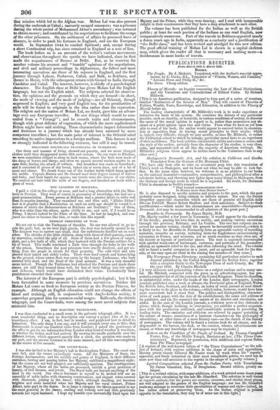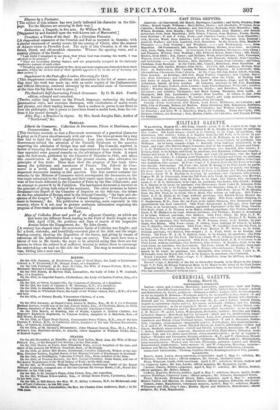PUBLICATIONS RECEIVED.
From March 20th to March 26th.
Boojes.
The People. By J. Michela. Translated, with the Author's especial appro. bation, by C. Cocks, B.L., Translator of "Priests, Women, and Families," "Antonio Perez and Philip IL," &c.
The Same. Cheap edition.
Theory of Morals: an Inquiry concerning the Law of Moral Distinctions, and the Variations and Contradictions of Ethical Codes. By Richard. Hildreth.
[This is an American publication, designed to form part of a series of treatises, entitled "Rudiments of the Science of Man." They will consist of Theories of Politics, Wealth, Taste, Knowledge, and Education, in addition to the Theory of Morals before us.
The leading characteristic of Mr. Hildreth's work is to make experience or induction the basis of his system. He considers the history of any particular practice, such as chastity, or homicide, in various conditions of society, to discover the cause of the moral opinion in regard to it, rather than pronounces any ab- stract or d priori opinion upon vice and virtue. From what we have as yet been able to read of his book, the author would appear to succeed better in examina- tion or exposition than in tracing moral principles to their origin; which is, indeed, very difficult; though we may ascribe, as does Mr. Hlldreth, or rather the Utilitarian school to which he belongs, particular moral laws to an experience of their usefulness. The book exhibits considerable ability and common sense; and the style of the author, probably from the character of his studies, is very close, calm, and measured—not at all like the majority of American writings. Mr. Hildreth's religious views appear to incline more to the Unitarians than to any other sect.]
Shalcspeare's Dramatic Art, and Ms relation to Calderon and Goethe. Translated from the German of Dr. Hermann Ulrici.
[We have only been able to take an occasional peep into this translation of Ulriei's work on Shakspere' and we know not when we may be able to look fur- ther. In the mean time, however, we welcome it as an addition to our books on the national dramatistLexhaustive, comprehensive, and philosophical after a scholastic fashion, and throwing new lights upon many things in Shakspere, from the German and foreign mode in which he is regarded. No doubt, Dr. Hermann Chid is obnoxious to Swift's remark- " That learned commentators view
In Homer more than Homer knew."
He is also disposed to ascribe systems and projects to the poet, which the poet probably never designed, being content to imitate nature. Nor can the Doctor altogether appreciate characters which are those of genuine old English daily life—as Falstaff,Master Robert Shallow, and their associates. Subject to these qualifications—which under the circumstances are unavoidable—Shakspeare's Dramatic Art may be recommended to all admirers of the great poet.]
Rambles in Normandy. By James Hairby, M.D.
[Dr. Hairby resided a few years in Normandy, it would appear for the education of his family; passing his own time in society, and making various excursions through the province, Brittany, and La Vendee. The two last subjects are re- served for another volume, should the present be favourably received,—which it is likely to be; for .Rambles in Normandy form an agreeable variety of travelling narrative, remarks on society, including hints for Englishmen exctu-sionizing or sojourning in France, and accounts, not so much overdone as they often are, of the history or legends of particular places. The text is copiously intermingled with spirited wood-cuts of landscapes, costumes and portraits of the peasantry; offering an agreeable relief to the eye, and often in.forming the mind. The volume will be found a useful companion on a jaunt, and an agreeable book for the fire- side, or the easy open-air chair in the coming fine months—if they come.]
The Newspaper Press Directory; containing full particulars relative to each Journal published in the United Kingdom and the British Isles; together with a complete Guide to the Newspaper Press of each County, &c. For the year 1846. By Charles Mitchell.
[A very elaborate and painstaking volume on a subject curious and to many use- ful M. Mitchell, connected with the press as an advertising-agent, has pre sented a complete list of all thejournals of the United Kingdom. These he classifies, in alphabetical order, under the heads of the London daily newspapers, London journals published once a week or oftener, the Provincial press of England, Wales, the British Isles, Scotland, and Ireland; an index of every journal at once direct- ing the reader to its place in the volume which index, however, would have been more convenient had it stood first. The politics and distinguishing character- ieties of each paper, with the date of its establishment, the name and address of its publisher, and (in the country) the nature of its district and circulation, are added. In the case of the London journals, a criticism more or less elaborate is given; which, though inclining to over-praise, yet exhibits a perfect acquaint- ance with the production criticised, and considerable acumen in perceiving, its leading traits. The statistics and criticism are relieved by papers partaking of the nature of essays; sometimes of a business character—as the philosophy of advertising; at other times of a more literary cast—as the sketch of the history of newspapers. The volume will be found a curious book for all classes, and in- dispensable to the bureau, the desk, or the counter, whence advertisements are issued, or where any knowledge of newspapers may be requisite.] Letters on the Condition of the People of Ireland. By Thomas Campbell Foster, Esq., of the Middle Temple, Barrister-at-law, (The Times Com- missioner). Reprinted, by permission, with Additions and copious Notes, from The Times newspaper.
A. reprint of the well-known letters of " the Times Commissioner" on the sub- ject of Ireland; with copious additions in the shape of notes and appendixes. Having pretty closely followed Mr. Foster week by week when his " reports" appeared, and freely remarked on their most remarkable points, we need not do more now than call attention to the reprint in the shape of a goodly volume.] Lyrical Compositions selected from the Italian Poets; with Translations. By James Glassford, Esq., of Douglaston. Second edition, greatly en- lard.
[This is a revised edition, with many additions, of a work printed some dozen years ago.for private circulation by the late Mr. Glassford. The selection is well varied as regards authors; but the poems are sonnets, canzones, and similar short pieces, not well adapted to the genius of the English language: nor has Mr. Glassford made any attempt to overcome their peculiarities of manner and style—indeed, he has rather aimed at preserving them. As the Italian onis printed opposite to the translation, they may be of some use in this light.
Rhymes by is Poetaster.
[The author of this. volume has very. justly indicated his character on the title- page. Yet the Rhymes are amusing in their way.] Belisarius; a Tragedy, in five acts. By William R. Scott. (Suggested by and founded upon the well-known tale of MarmonteL] Creation; a Vision of the Soul. By a Christian Platonist. (A rhapsodical expansion of the Creation and Fall as narrated in Genesis; with aidmilar treatment of sundry events till the coming of Christ, after the manner of Adam's vision in Paradise Lost. The style of this Creation is of the most forced, literal, and old-monkish character. Witness the opening verse, and a passing glimpse of the Devils- , Last night I imagined in my sleep, that when God was creating the world, I was
allowed to be present." a a a a " They arc breathing hissing flames, and are perpetually occupied in the furiously vindictive pursuit of each other.
"Treading upon, and enveloped by fire, their parched tongues are distended from their mouths, whilst the ardent heat of their eyeballs appears to be in the act of burning out their sockets.") Supplement to the Post-office London Directory for 1846. This Supplement contains additions and alterations in the list of names occur- since the work was made up; with an entire reprint of the Parliamentary Official Directory, rendered necessary by the unsettled state of Government at the time the big book went to press.] ' The Student's Self-Instructing French Grammar. By D. M. Aird. Fourth
, edition, enlarged and corrected. (Twelve rather long lessons on the French language; embracing the leading
grammatical rules, and exercises thereupon, with vocabularies of useful words
and phrases, and short reading lessons. Such a multum in parvo is not fitted to form the philologist; but it seems to have been found a useful book, from the edi- tions it has passed through.] Alice Ray ; a Romance in rhyme. By Mrs. Sarah Josepha Hale, Author of "Northwood," Sm.
SERIALS.
Liberte du. Commerce. Collection de Documents, Pilces et blateriaux, sans Commentaires. No. L [This brochure reminds us that a Free-trade movement of a practical character mgoing on in France simultaneously with our own. The wine-growers for a long time had to fight the battle single-handed. Last year, however, the French Government invited the attention of the Conseils Generaux to the question respecting the admission of foreign iron and steel The Councils reported in favour of removing the restrictions on the importation of these articles; to which they appended some general remarks on the advantages of free trade. A report Ilion the Salt-trade, published by the Chamber of Deputies in 1845, and taken into consideration at the opening of the present session, also advocates the principles of free trade, These facts show the progress of free trade views among the politicians and merchants of France. The Liberte du Com- merce is a serial, intended to present in an accessible form the most important documents bearing on this question. This first number contains the remarks by the Minister of Commerce which accompanied the documents on the iron-trade submitted to the Councils, and their report upon them; a speech in fa- vote of free trade delivered in the Chamber of Peers by the Duc d'Harcourt; and an attempt to answer It by M. Fulchiron. The last-flamed document is inserted on the principle of giving both sides of the argument. The editor promises in future livraisons-the Report of the Chamber of Deputies on the Salt-tax; the debate on the free admission of foreign steel in the General Councils; "the logic and elo- quence of the League"; "Apologies of Colonel Thompson"; "Free-trade move- ment in Germany," &c. The publication is interesting, more especially in this country, where it is not easy to procure authentic information respecting the progress of Free-trade opinions on the Continent.]
Mar.
Map of Culloden Moor and part of the adjacent Country; on which are laid down the different Roads leading to the Field of Battle fought on the 16th April 1746, the positions and lines of march of the respective Armies before the Engagement, &c. By John Gowie. [A century has elapsed since the memorable battle of Culloden was fought; and lo! a fresh, elaborate, and beautifully-executed plan of the field and the neigh- bouring country, showing the disposition of the forces, and giving by means of references all the information that a map can convey. This must have been a labour of love to Mr. Gowie; the more to he admired seeing that there are few persons to whom the subject is of sufficient interest to induce them to encourage his undertaking-at least on this side the Tweed. The map is mounted on can- vass, folding into a neat case.]



























 Previous page
Previous page